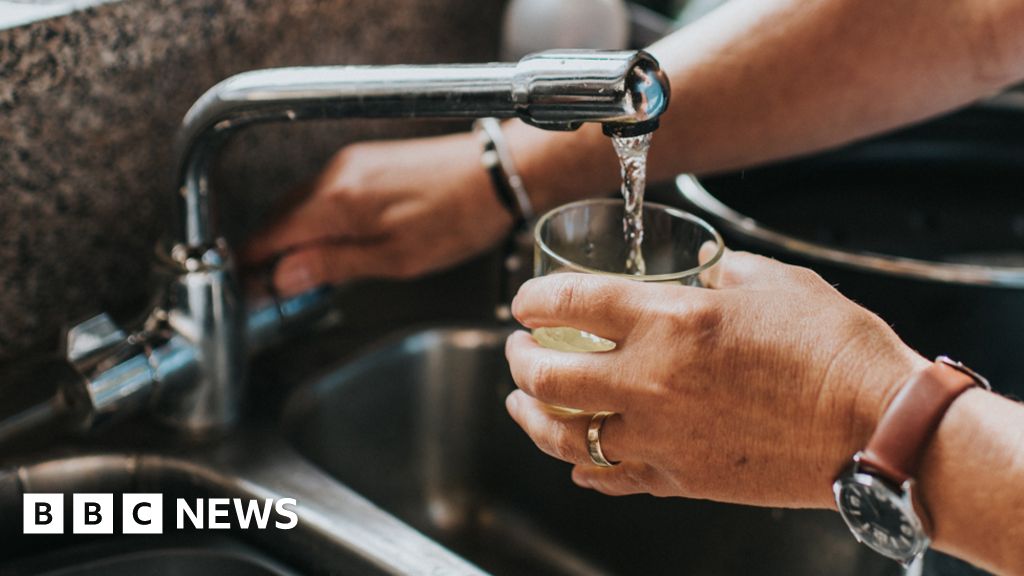- By Kevin Peachey
- Cost of living correspondent
Image source, Getty Images
Water companies are forecasting an above-inflation rise in average household bills in April, drawing criticism from campaigners.
The average annual water and sewerage bill is expected to rise by 6% in England and Wales, up £27 to £473, says suppliers’ trade body Water UK.
In Scotland, water and waste charges will go up by 8.8%, a rise of £36.
Water firms have been facing intense scrutiny after the dumping of sewage into rivers.
“Next year will see record levels of investment from water companies to secure the security of our water supply in the future and significantly reduce the amount of sewage in rivers and seas,” said David Henderson, chief executive of Water UK.
He said companies in England and Wales would invest more than £14.4bn in the next financial year, the highest annual investment on record.
Giles Bristow, chief executive of the Surfers Against Sewage charity, described it as “a small first step of what will be a very long road to recovery”.
He said: “This is a signal that the water industry is at last, perhaps, waking up to the sheer scale and extent of the sewage scandal and the chronic state of our water system in the UK.”
Bills can vary
The average expected bill is calculated by companies, and will be above the latest inflation rate of 4%, which charts general price rises. Actual individual bills can differ significantly owing to regional variations and usage levels for those on a meter.
In England and Wales, Wessex Water and Anglian Water are at the top end of the scale, with average bills set to increase to £548 and £529 respectively, while Northumbrian customers will see the lowest average bills of £422.
The watchdog has also told suppliers that they must offer help to those who were struggling with bills.
“We are very aware, for those who are already struggling, this will be a real worry. As such, water companies must do all they can to protect those who are most in need of a helping hand,” said chief executive David Black.
More than a million households in England and Wales get cheaper bills through companies’ social tariff schemes, saving them an average of £151 last year. Around half of households in Scotland receive financial support with water charges.
Five water companies use some of their own profits to help fund social tariffs, with consumer groups are calling for others to join them.
Mike Keil, chief executive of the Consumer Council for Water (CCW), said: “Almost a fifth of households say they struggle to pay their water bill and these rises will heap even greater pressure on low-income customers.
“If water companies are serious about rebuilding trust in the sector they should use some of their profits to help people who cannot afford another bill rise.”
Commenting on why water companies are continuing to use profits to pay dividends to shareholders, Water UK’s Mr Henderson claimed they were 3% on average across the industry and had been that rate since the start of the decade.
“If we hit dividends you’re going to not get investment that we need. Investors around the world can park their money in other sectors and other countries. It is vital that they put their money here,” he said.
Separately, Ofwat is considering proposals by water companies in England and Wales to increase bills by £156 a year by 2030 to pay for upgrades and reduce sewage discharges.
The increase would allow infrastructure spending to almost double to £96bn, Water UK said.
But Jim Wright, manager of the global infrastructure income fund at Premier Miton, suggested that even this increase might not be enough to upgrade the UK’s water and sewage systems.
“The numbers involved are enormous,” he told the BBC Radio 4’s Today programme.
“Obviously you’re replacing systems which in some cases are 100 years old. It is many tens of billions of pounds potentially over the next 10-20 years. Clearly that has to be weighed against what people can afford in their bills. It is a tough dilemma for Ofwat.”
Mr Wright acknowledged that customers would have to bear the brunt of the cost of improving Britain’s infrastructure, but said the average household is paying £1.29 a day for water and sewage services.
“That clearly isn’t a huge amount of money,” he said. “If that increases yes, it hits people’s pockets, but it is an affordable number arguably if that increases by 30-40% over the next 10 years and if you get the right outcomes from that spending.”
Are you affected by the issues raised in this story? Share your experiences by emailing [email protected].
Please include a contact number if you are willing to speak to a BBC journalist. You can also get in touch in the following ways:
If you are reading this page and can’t see the form you will need to visit the mobile version of the BBC website to submit your question or comment or you can email us at [email protected]. Please include your name, age and location with any submission.

Robert Johnson is a UK-based business writer specializing in finance and entrepreneurship. With an eye for market trends and a keen interest in the corporate world, he offers readers valuable insights into business developments.








